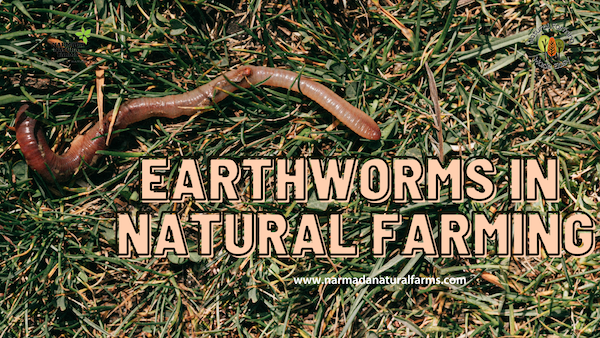Earthworms play a crucial role in natural farming as they aerate the soil, improve soil structure, and increase soil fertility by breaking down organic matter into plant-available nutrients. Earthworms also promote healthy soil microorganisms, which help maintain soil health and fertility. Additionally, their burrowing activities improve water infiltration and drainage in soil, reducing soil erosion and promoting plant growth. By improving soil health, earthworms can help increase crop yields and reduce the need for chemical fertilizers and pesticides in natural farming systems.
Also Read: The What, Why, and How of Soil Health at Your Farm
Earthworms feed on organic matter in the soil, including dead plant material, leaves, roots, and other organic matter. They are decomposers, breaking down organic matter into simpler compounds that can be taken up by plants as nutrients. In a farm setting, earthworms can feed on the organic matter created by crop residue, cover crops, and compost. They also consume other soil microorganisms, such as bacteria and fungi, as part of their diet. Maintaining a high level of organic matter in the soil and reducing the use of harmful chemicals will help create a healthy environment for earthworms to thrive and continue improving soil fertility.
In natural farming, earthworms are encouraged to thrive in the soil. This is achieved by maintaining a healthy soil environment, which includes avoiding the use of chemical fertilizers and pesticides that can harm earthworm populations. Additionally, adding organic matter to the soil, such as compost, and practising crop rotation can help to increase earthworm populations.
Also Read: How To Increase Organic Carbon At Your Farm?
To increase earthworms in natural farming, the following steps can be taken:
- Maintain organic matter in the soil: Earthworms feed on organic matter, so maintaining a high level of organic matter in the soil will provide a food source for them. This can be done by adding compost, green manures, or other organic materials to the soil regularly.
- Avoid excessive tillage: Excessive tillage can damage the soil structure and reduce the number of earthworms. Instead, practice minimal tillage or no-till methods to maintain soil structure and encourage earthworm populations.
- Provide adequate moisture: Earthworms need moist soil to survive, so it’s important to ensure that soil moisture levels are adequate, especially during dry spells.
- Minimize the use of chemical fertilizers and pesticides: Chemical inputs can be harmful to earthworms and soil microorganisms, reducing their populations. Instead, use natural methods such as compost and cover cropping to improve soil fertility.
- Maintain a diverse crop rotation: A diverse crop rotation can help maintain soil health and provide a variety of food sources for earthworms, supporting their populations.
***
Follow us on Facebook, Twitter, and Instagram.
We are on Youtube as Natural Farming Made Easy.
